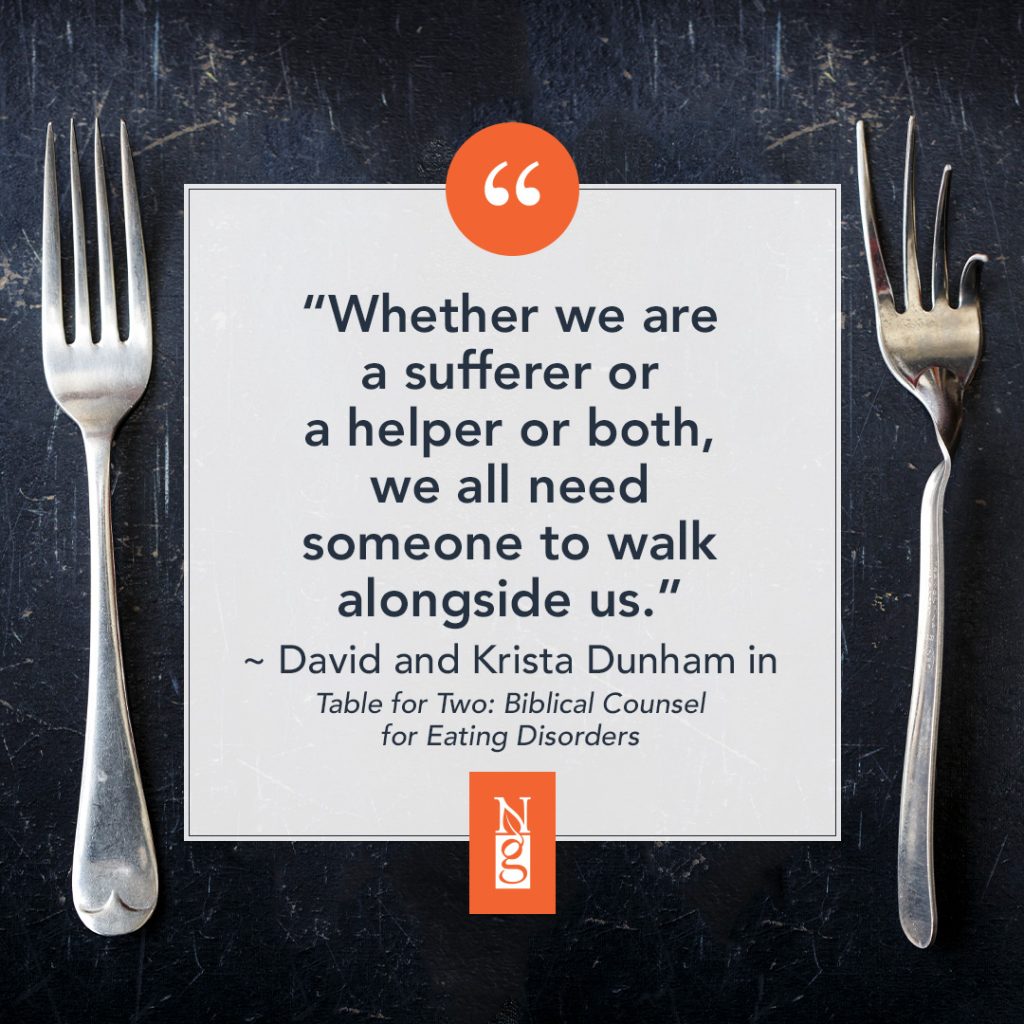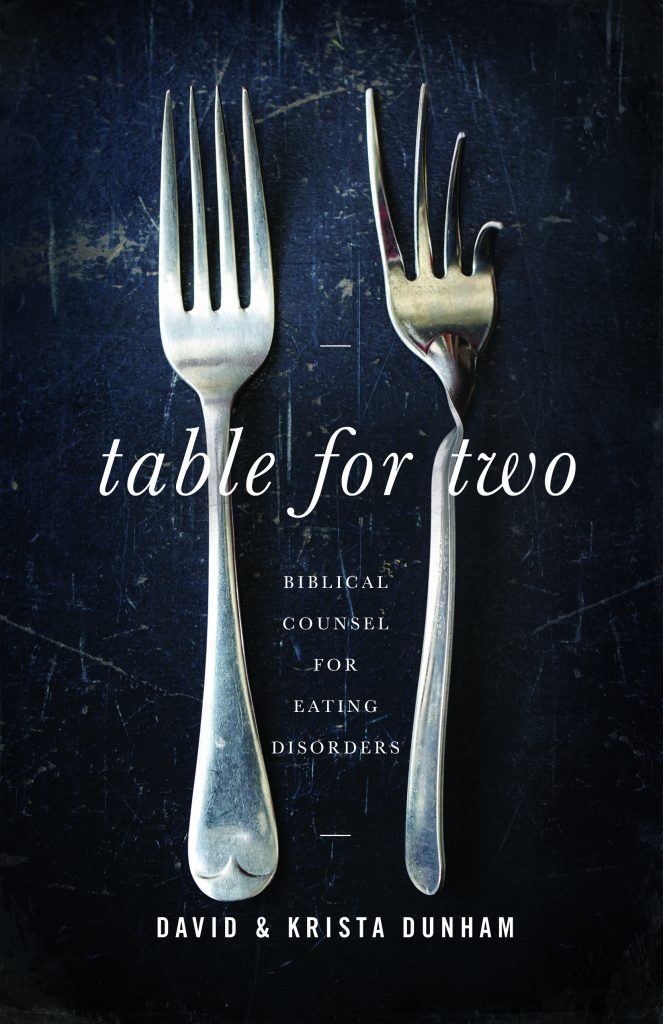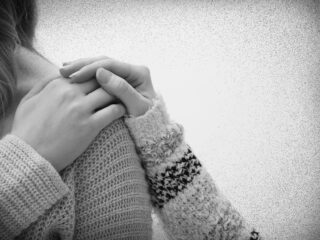Breaking free from an eating disorder is difficult and complex. Those who are suffering often feel misunderstood and struggle with feeling alone and afraid, ashamed to tell those closest to them. At the same time, their loved ones also feel helpless and ill-equipped about how to help and care for them. Within this dynamic, hurt, disappointment, and neglect often thrive. From the unique perspective of a husband and wife team, Table for Two: Biblical Counsel for Eating Disorders shares Krista Dunham’s journey to freedom from her eating disorder while David Dunham shares insights as the loved one coming beside her.
In this interview, they share some of their story.
Q: Krista, could you tell us a little of your story? When did you first realize you were fighting a battle with food?
Krista: Throughout my childhood and teenage years, I had always been very active with a naturally thin frame. But when I started college, I stopped playing sports and started eating more late-night snacks. I gained the normal “freshman fifteen,” but very quickly felt like I needed to get my weight back under control. I started monitoring my intake of sweets and started going to the gym. But after a car accident forced me to look death in the face, I realized that I did not have the kind of control over my life that I thought I had. Instead of looking to God and being amazed at his sovereignty and control for allowing me to live, I tried to gain my own control. The car accident ended up being a tipping point for me. The moment that I could be alone with my feelings about what had happened, I ate everything in my room and immediately felt like I needed to get rid of it all by purging. It was that moment that I realized I was facing something much bigger and scarier than I even understood.
From that point on, I was no longer in control of my diet and exercise. My diet and exercise were controlling me. I didn’t want anyone close to me to know what was going on, but I was terrified of what was happening to me, so I reached out to my boyfriend who lived eight hours away from me at the time. Together we ended up finding help through a combination of medical professionals, nutritional guidance, and biblical counseling. I benefitted from having a helper by my side to ask questions, hold me accountable and reinforce the help I was getting from other sources.
Q: David, did you realize Krista was struggling, or did she have to tell you? How did you respond to the news?
David: When Krista told me that she had an eating disorder, it was a complete shock. I had no clue that there was anything wrong. I owed my ignorance to several factors: (1) We were hours apart attending different colleges, (2) I didn’t know anything about eating disorders, so I wouldn’t have even been able to identify the signs if there were any, and (3) Krista was good at hiding these behaviors.
Initially I was shocked and deeply concerned. I tried to be compassionate and understanding, and because I am a planner, I started developing a plan of action on how I was going to help Krista. Over time, however, my motivation waned and my frustration grew. Because I didn’t know enough about the issues, all of my plans were incredibly simplistic and naive. Eventually we got to a place in our relationship where we just didn’t really talk about it until some sort of crisis arose.
Q: Physically and psychologically, what is an eating disorder? What are some of the underlying motives that drive an eating disorder?
Krista: An eating disorder is a pattern of destructive eating habits which significantly impair physical health and psychosocial functioning. There are three common types of eating disorders, though there are a host of variations on these: anorexia (a form of self-starvation), bulimia (a cycle of binging and purging), and binge eating (a compulsive consumption of massive amounts of calories at one time).
The motives are as diverse as the individuals who engage in the behaviors, but there are several common ones we can identify. One of the more dominant motives is control, which manifests in an effort to counterbalance feelings of insecurity in other areas of life. I control my food or my weight because it’s one area where I feel like I can have that level of power. Other motives include self-medication, appearance, pride, and self-punishment. In each case a sufferer is looking to their destructive habits to provide something for them to which God offers a better alternative.
Q: How does an eating disorder impact the loved ones of a sufferer?
David: No suffering or sin is ever limited in its effect. My love and concern for Krista, for example, meant that I often felt anxious and frustrated because of the harm she was causing herself. No one wants to see their loved ones killing themselves, and functionally, that is what destructive eating habits are doing. Her restrictions and anxieties also meant that there were certain social events that we couldn’t attend together. Meals with friends and family were a big deal, so we struggled to have people over or go to their homes because such events were problematic for Krista.
Ultimately, an eating disorder impacts your relationships with those you love. In order for Krista to engage in her behaviors she needed to cut off more and more social events and relationships. People and activities threatened her routines and threatened to expose her behaviors, so she kept people at arm’s length, even me. This created lots of stress on our relationships, which was compounded by my own poor responses to her.

Q: What were some of the things people said or did that were well-intentioned, but really didn’t help? What did people do or say that were helpful?
Krista: Some people initially tried to educate me on what I was doing to my body. Even as some of the ill-effects started to set in, it didn’t matter because all those things were worth the sacrifice to me in order to get what I wanted.
At one point, I was given a pack of memory verse cards that were centered around the topic of food. Away from the context of the rest of the Bible, and without the solid groundwork of the gospel, the verses were trivial and were even a bit misleading at times. What I really needed was the big picture of who God is. I needed to know what Christ had done for me through his perfect life and substitutionary death. Then I could use those memory verses, in context and in conjunction with the surrounding verses, to guide me back to those major themes of the gospel and God’s character. The verses could remind me of what I knew to be true of God, and they could give me fuel in applying the complete concept of redemption. I needed bigger concepts of truth instead of just snippets of it.
Something that really did help was having someone who would listen without automatically giving me a solution. David was actually really bad at this at first. It is so natural for a helper to want to fix things. But when he started to listen and empathize, he was a much better helper to me. Often when he tried to come up with an immediate solution, it ended up being trite and confusing. When I felt out of control and without a plan, his response might have been something like, “Just eat three meals a day and take a walk with me after dinner. Do that every day and make it a habit.” It felt like my feelings were being boiled down to simple answers. But when he listened and prayed with me, when he was willing to say, “I don’t know” sometimes, this made me feel safe and loved and heard so that when there were clear opportunities for him to help, I would be ready to hear from him.
Q: What struggles did you face as a helper? How did you deal with feelings of helplessness?
David: My biggest struggle was trying to understand her. I didn’t take the time to dig into the literature and the resources available but even if I had, there is also some degree of separation between the sufferer and the helper. I wasn’t inside her head and so I could never perfectly understand her emotions, reactions, and logic. Her behaviors didn’t make sense to me, and as a result, I was often tempted to be impatient and insensitive. Learning to listen and simply accept Krista’s feelings as genuinely hers was important.
The hardest part about watching a loved one go through an eating disorder is seeing more clearly than they do what is happening but being unable to convince them to stop. You can’t repent for someone else, you can’t change someone else, and attempting to force them usually doesn’t accomplish long-term success. In a lot of ways, I really was helpless. I had to learn that being helpless and being hopeless aren’t the same thing, and that made a difference as years went by.
Q: What realization finally helped you turn the corner to recovery?
Krista: The first realization that really helped me was that my eating disorder involved sin. I was tempted to believe that it was something that had just happened to me or that it was entirely the fault of my circumstances. But I made huge strides in getting better when I recognized that I had made sinful choices and had sinfully made idols out of success and appearance. I was sinfully trying to gain control that belonged to God. After realizing the ways that I had sinned, the remedy was that I could repent to God and because of Christ’s redemptive work on my behalf, I could be forgiven. Christ was the answer to my sin.
But it was also important for me to realize that I had experienced suffering. I was in a car accident in which I could have died. It shook my understanding of control and made me question God’s sovereignty. I suffered because of my circumstances and then formulated ideas and actions to deal with that suffering. And it was helpful to understand that my eating disorder was creating more suffering, so that by the time I was seeking help I was dealing with the suffering from the car accident but also the suffering that my eating disorder had caused. Christ was also the answer to my suffering. He spent thirty-three years on earth understanding and entering into that suffering. And he died to redeem my suffering so that it can be used for God’s glory and my sanctification.
Q: How does Biblical counseling provide a framework for overcoming disordered eating?
David: The Bible is far more robust on counseling issues than many realize. In particular, we have found the Bible presents us with a framework for problems that drives us back to the heart. The “heart” in the Scriptures is related to our desires, will, and thoughts, and it is out of the heart that both the “mouth speaks” and we act. As we approached Krista’s destructive eating habits, we began to see from Scripture that these were more than just behaviors, they were behavioral responses to desires. Further, the Bible provides us ways to analyze those desires and channel them in healthy and God-honoring ways.
Through Scripture’s overall depiction of people, problems, and change we have developed a philosophy of counseling that provides a framework for working through eating disorders. We call it the Four R’s: Responsibility, Relationship, Restructuring, and Remaining. The Bible treats us as both sufferers and sinners and yet it invites us to take responsibility for our actions, attitudes, and desires. The Scriptures also encourage us to see the importance of our relationship with God through Jesus Christ and with God’s people. Scripture’s teaching on change urges us to both put off destructive habits and replace them with godly ones, so there is a restructuring of our whole lives that must take place as we work through eating disorders. Finally, Scripture invites us to hope and persist in godliness as we move throughout life.
Q: What one piece of advice or encouragement would you like to share today with couples who are trying to start the journey to overcoming disordered eating?
The two biggest keys in our dynamic were learning to be patient and getting outside help.
Krista: Change is neither easy nor quick, and so learning to view change as a process and being patient with setbacks is important. David wanted to pressure me to change, and I wanted to give up when it was hard. Patience went a long way to keep us both engaged in the journey towards recovery.
David: Getting help is also vital. I needed to be involved in the process because I was most consistently and most intimately involved in Krista’s life. But I couldn’t do it all. Professional helpers were of immense importance to her recovery. As a spouse struggling to care for her, I needed help too. I needed someone who could not only guide me in how to care for her, but who could also support me when I was discouraged and fatigued.
Patience and help were the biggest difference makers in our lives. So, if you are just starting this journey, those are the best places to start.
TABLE FOR TWO: BIBLICAL COUNSEL FOR EATING DISORDERS
Breaking free from an eating disorder is difficult and complex. From the unique perspective of a husband and wife team, Table for Two shares Krista Dunham’s journey to freedom from her eating disorder while David shares insights as the loved one coming beside her.






